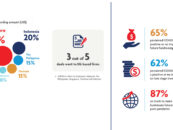The COVID-19 outbreak has already had an enormous impact on the global economy, shaking up all industries. When thinking of this crisis it helps to remember that the birth of fintech was catalysed by the Global Financial Crisis circa 2008-2009, similarly, with the current circumstances, there’s bound to be players with inherent advantaged despite these trying times.
In the fintech sector, the impact of the pandemic can already be seen in terms of funding, which, until the crisis, had stood at record levels. The outbreak put an end to this with now fintech deals falling, according to CB Insights.
Total deals and dollar amounts to fintech companies globally have been down since December 2019, and according to the data analytics company, Asia, Europe, and North America are set to see the lowest quarterly deal count in years.

Fintech Deals YoY, CB Insights, March 2020
In terms of funding amount, fintech companies are projected to raise about US$6 billion in Q1’20, a level not seen since 2017, CB Insights says.

Fintech Funding, CB Insights, March 2020
Besides funding, the impact of the COVID-19 pandemic on fintech business activities varies across segments with some being more exposed than others. According to several experts and analysts, some industries, including trading and contactless payments are expected to see a boost in the short to mid-term, while others, including challenger banks and robo-advisors, are set to see a downturn.
The fintech winners
In an analysis produced in collaboration with venture capital firm Finch Capital, European tech media outlet Sifted argues that fintechs in the trading space and those providing trading infrastructure will likely benefit from the pandemic – and that’s because of the market volatility that came along with the crisis.
European retail trading apps including Freetrade have already reported a boom in account openings, while US-based Robinhood has experienced “major outage” due heavy volume market action.
This is the opportunity for zero-commission trading startups to gain new users, the report says. They should now focus on retaining these customers and push the sales of more lucrative products than basic stock trading.
Another segment that has witnessed a surge amid the pandemic is contactless payments. Despite the overall contraction in the payments sector due to falling consumer spending, contactless payments have grown rapidly due to it being perceived as a more hygienic alternative, according to a research by McKinsey.
In Germany, for example, the amount of contactless bank card transactions has increased from 35% to 50% since the start of 2020, according to the Association of German Banks.

Contactless transactions per adult, Verisk Financial Research, March 2020
For McKinsey, the COVID-19 crisis will substantially transform the payments sector. Some of the fundamental changes the industry should be prepared for include rising adoption of touchless/contactless payments, as well as the integration of capabilities such as digital IDs and transaction monitoring and reporting within digital wallet platforms, the company says.
Finally, another segment expected to see a boost is fintech enablers and infrastructure providers, with Finch Capital forecasting a growth in demand for artificial intelligence (AI), the Internet-of-Things (IoT) and software-as-a-service (SaaS) as financial institutions ramp up their digitalization efforts.
The fintech losers
On the other end of the spectrum, segments including challenger banks, foreign exchange, wealth management and robo-advisor, as well as alternative lending, are set to struggle the most within the next six months and will likely experience a decline in revenue and users, according to the Sifted analysis.
For challenger banks, the financial slowdown could amplify the existing trust gap and some users might even choose to withdraw their deposits into “brick and mortar” accounts.
Already, several players in the space are witnessing a slowdown with German challenger bank N26, for example, stating in late-March that it had seen a decline in its card sales, as well as in account openings in certain markets.
Currency exchange processors are also expected to experience some decline, notably due to the decrease in cross-border transactions volume for both retail and corporate transactions.
As for wealth managers and robo-advisors, the financial downturn could frighten investors and prompt them to withdraw their deposits. Some might switch to established wealth management firms who match the zero-commission model while offering the comfort of human advice.
Finally, the alternative lending space is expected to face hardship due in part to more SMEs defaulting on their loans. For peer-to-peer (P2P) lending platforms, the economic downturn could see lenders’ risk appetite decline, leaving platform operators struggling to fill loan requests.
Earlier this week, it was reported that RateSetter, one of the UK’s biggest P2P lender, was considering a sale due to the increasing risk of loan defaults among small businesses.






